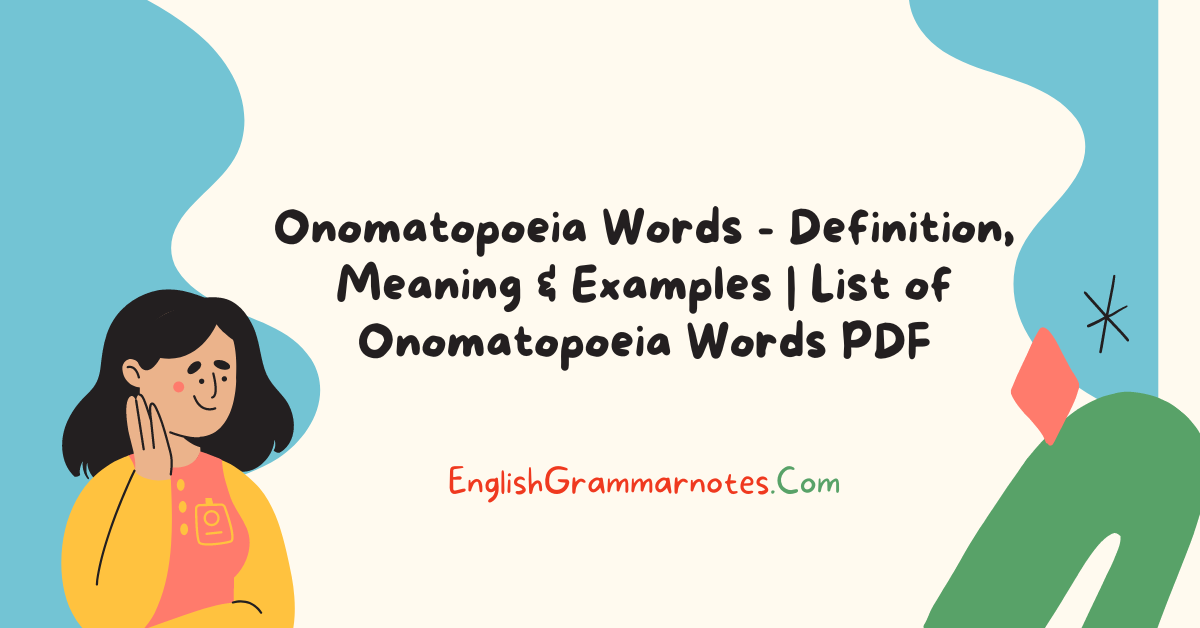Onomatopoeia Words are words that sound similar to what they describe. Whenever you come across an onomatopoeic word you are sure to identify the sound that it imitates. In Greek, the term onomatopoeia signifies “creating or making names,” which refers to the notion of imitating sound using words.
For example, take the word splash, you can immediately connect the word with the sound of something that is falling into the water. Other onomatopoeic words include buzz, swoosh, roar, mumble, slam, etc. However, there are many words like munch, sigh, or chew that are commonly taken to be onomatopoeias, but they are not.
Onomatopoeia Words Examples
Given below is a list of the commonly used Onomatopoeic words:
- Crash
- Rustle
- Buzz
- Splash
- Mumble
- Slam
- Roar
- Howl
- Whistle
- Crunch
- Honk
- Slither
- Croak
- Squawk
- Bang
- smack
- stomp
- thwack
- tinkle
- toot
- tweet
- wham
- woosh
- wow
- baa
- bang
- boom
- cheep
- clack
- cluck
- crack
- crunch
- giggle
- groan
- haha
- hee hee
- moo
- quack
- ring
Get a comprehensive list of some of the most used or Common Words in English along with example sentences.
Onomatopoeic Words in Groups
Onomatopoeic words can also occur in combinations, that is when they reflect different sounds of a single object. For example, a group of words indicating distinct sounds of water are: sprinkle, drizzle, plop, splash, gush, and drip.
In the same way words like a growl, giggle, grunt, murmur, blurt, and chatter refers to human voice sounds.
Uses of Onomatopoeia
Onomatopoeic words can be useful to you in several ways:
- Draws the reader’s attention as Onomatopoeic words are interesting and compelling to read.
- By imitating sounds these words enhance the feeling or sense associated with a particular word.
- Play a significant role in the way words are written, read, and understood.
- Using Onomatopoeia you can freely create new words if you have an idea of the specific sounds.
- Helps to create mental images of sounds and sights
- Onomatopoeic words can be used as different parts of speech including nouns, adjectives, verbs, etc.
Onomatopoeia Example Sentences
As a noun: The children dived into the pool with a splash
As an adjective: The evening was calm, with the chirping of birds and buzzing of bees.
As a verb: The engine finally roared to life.
On the whole, it gives life to any ordinary sentence.
Onomatopoeia vs Phanopoeia
Similar to Onomatopoeia, Phanopoeia is a literary device in which a sensation of something is captured by the words used. Sense of things rather than sound is what phanopoeia imitates.
See Similar:
FAQs on Onomatopoeia
1. What are Onomatopoeic Words?
Onomatopoeia words are words that sound imitate what they describe. On encountering an onomatopoeic word you will identify the sound that it imitates. In Greek, the term onomatopoeia means “creating or making names,” which refers to the notion of imitating sound using written text.
2. Give examples for Onomatopoeia Words?
Onomatopoeia words sound similar to what they describe. Examples include buzz, splash, giggle, roar, groan, etc.
3. Distinguish between Onomatopoeia and Phanopoeia?
Related to Onomatopoeia, Phanopoeia is a literary device in which a sensation of something is captured by the words used. Sense of things rather than sound is what phanopoeia imitates.
4. What are some of the words used to describe the different sounds of water?
Onomatopoeic words imitate what they describe. For example, take the word splash, you can immediately connect the word with the sound of something that is falling into the water. Other words indicating distinct sounds of water are: sprinkle, drizzle, plop, splash, gush, and drip.
Conclusion
Onomatopoeic words when used correctly and effectively can be one of the powerful weapons with which you can improve your writing skills. The use of Onomatopoeic words will help the readers easily grasp what you convey. However, restrain yourself from the overuse of Onomatopoeia as it will affect the pace of your writing and jolt the readers out of what you write.
